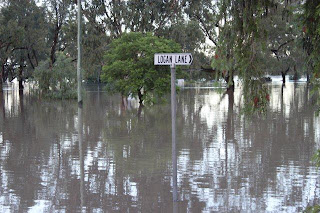


I reported in these pages 16 months ago about the terrible bush-fires in Victoria and other places and about the massive dust storms affecting south-east Australia. I have just watched a television program featuring our head of Division, Professor Martin Thoms, reporting on an amazing transformation of western NSW and Queensland. They're in transition from a devastating 1 in 100 year drought to a 1 in 100 year flood. But this is a flood of incomprehensible proportions for my European readers.
The area that has just gone under water is estimated at half the size of Europe. Yes, Europe! Something like 9 or 10 major tributaries of the Darling river have simultaneously flooded after persistent heavy rain over a 3 month period, including the Paroo, Narran, Birrie, Culgoa, Warrego, Condamine, Balonne and Maranoa. I have been fortunate to see many of these rivers during my travels in southern Queensland over the years, but mostly they were little trickles, not sheets of water. And floods are not fast moving in this part of the world. Some of these river systems have been in flood for the last two months and they will still contain flood waters in three months time as the water moves downstream to the Darling and on to the junction with Murray and then to the Southern Ocean by June or July. The flood peak moves downstream at a regular speed and some farmers know two months or more in advance of when they will be inundated.
It gets even stranger. Australia's ecosystems are tailor-made for long drought and periodic major floods. The far west bush springs to life after heavy rain and organisms buried in hard-baked can spring to life after 'sleeping' for up to 50 years. Trees and bushes suddenly grow at prodigious speed, as do the grasslands. Water birds migrate in from coastal zones maybe 500 or 1000 km away - these are humongously large river systems in areal extent! Birds and animals (including iconic Kangaroos and Emus) mate and have lots of young fast. Farms, which may be isolated by flood waters for several months on end, suddenly become hugely profitable and livestock prices soar, and no doubt national economic growth, already strong, will add another 1% on top. And all goods and services have to be brought in by helicopter. The TV program actually showed sheep being hoisted aloft from flooded paddocks and deposited kilometers away on rare patches of high ground.
I attach some borrowed photos of flooding around St George. For UK readers, such a place exists and I've even been there. Look it up on a map. It's at the confluence of the Balonne and Condamine river systems mentioned earlier.
AS
1 comment:
It sounds almost biblical. Richard
Post a Comment